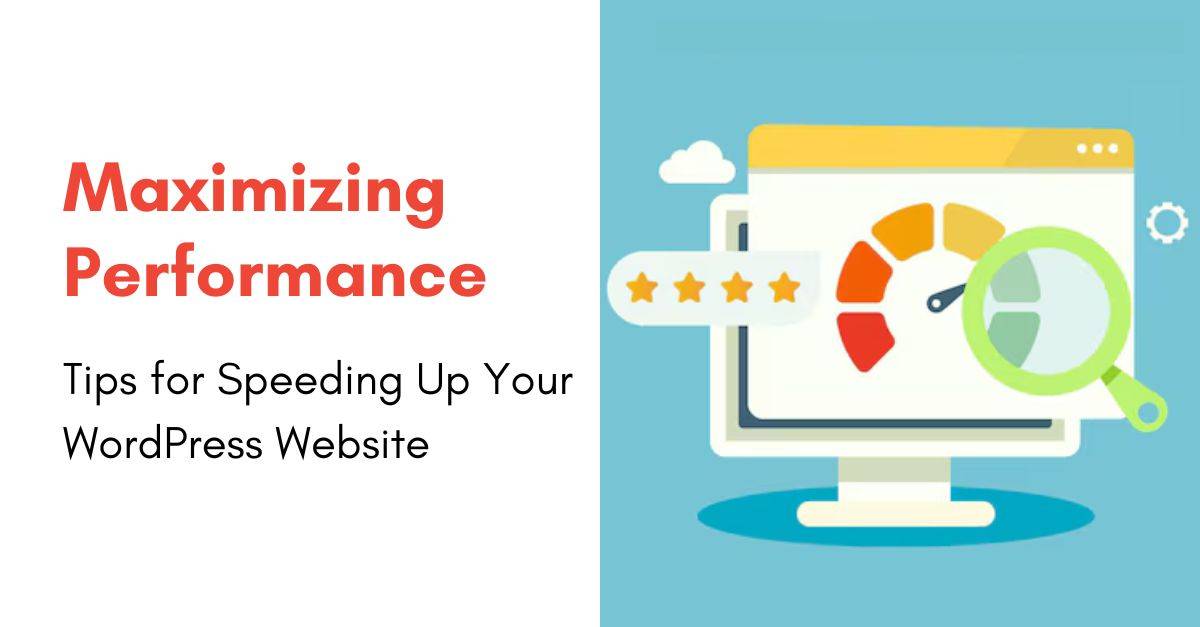In today’s digital landscape, speed is paramount. With users expecting instant access to information, the speed of your website can make or break your online success. WordPress websites, while incredibly versatile and user-friendly, can sometimes lag in performance, leading to decreased user satisfaction and potential loss of revenue.
Website speed refers to how quickly a website loads its content and elements. It directly impacts user satisfaction, as faster-loading websites provide a smoother and more enjoyable browsing experience. Key metrics for measuring website speed include page load time, time to first byte (TTFB), and server response time.
However, fear not, as we’ve compiled a comprehensive guide to help you maximize the performance of your WordPress website. Let’s dive in!
Strategies for Maximizing Performance on Your WordPress Website
Optimize Your Images
Images are integral to engaging your audience and conveying your message effectively. Large image files can considerably hinder the loading speed of your website. To combat this, optimize your images before uploading them to your WordPress site. Utilize image compression tools or plugins to reduce file sizes without compromising quality. Additionally, consider using responsive images to ensure optimal display on various devices, further enhancing user experience.
Leverage Browser Caching
Browser caching allows web browsers to store copies of your website’s pages, scripts, and images, reducing the need to re-download them upon subsequent visits. By leveraging browser caching, you can significantly improve load times for returning visitors. WordPress offers several plugins that enable browser caching effortlessly. Simply install and configure one of these plugins to start reaping the benefits of browser caching immediately.
Implement Content Delivery Networks (CDNs)
Content Delivery Networks (CDNs) are a network of servers distributed geographically to deliver web content more efficiently to users based on their location. By distributing your website’s assets across multiple servers, CDNs reduce latency and improve load times, enhancing the overall performance of your WordPress site. Numerous WordPress plugins seamlessly integrate with popular CDNs, allowing for easy setup and configuration.
Minify CSS and JavaScript Files
CSS and JavaScript files play a crucial role in shaping the visual and interactive elements of your WordPress website. However, excessive whitespace, comments, and unnecessary characters within these files can increase their size, leading to longer load times. To address this issue, minify your CSS and JavaScript files to remove redundant elements and streamline their code. WordPress plugins automate this process, making it quick and hassle-free.
Enable GZIP Compression
GZIP compression reduces the size of your website’s files before sending them to users’ browsers, resulting in faster load times and reduced bandwidth consumption. By enabling GZIP compression on your WordPress website, you can significantly improve performance without sacrificing content quality. Many web hosting providers offer GZIP compression as a built-in feature, while WordPress plugins provide easy-to-use options for enabling this optimization technique.
Optimize Your Database
The database is the backbone of your WordPress website, storing essential information such as posts, pages, comments, and user data. Over time, databases can become bloated with redundant data, leading to decreased performance. Regular database optimization is essential to maintain peak performance levels. Utilize WordPress plugins designed specifically for database optimization to clean up unnecessary data, improve efficiency, and boost overall site speed.
Choose a Lightweight Theme
Your WordPress theme significantly impacts your website’s performance. While feature-rich themes may offer extensive customization options, they often come with bloated code and unnecessary functionalities that can slow down your site. Opt for lightweight, minimalist themes that prioritize speed and performance. Look for themes that follow best practices for coding standards and incorporate responsive design principles to ensure optimal performance across all devices.
Reducing HTTP Requests
Each HTTP request made by a web page contributes to load time. Minimize the number of HTTP requests by combining CSS and JavaScript files, reducing the use of external scripts and resources, and optimizing third-party integrations. Optimizing HTTP requests can greatly enhance the speed of your website.
Implementing Responsive Design
Responsive design ensures that your website looks and performs well across various devices and screen sizes. Design your WordPress website with responsiveness in mind, using flexible layouts and media queries to adapt to different devices. A website optimized for mobile devices not only improves user experience but also has a positive effect on search engine rankings.
Unleash the Full Potential of Your WordPress Website
Maximizing the performance of your WordPress website is essential for providing users with a seamless browsing experience and achieving your online goals. By following the tips outlined above, you can optimize your site for speed and efficiency, ultimately boosting user satisfaction, engagement, and conversion rates. Implement these strategies today to take your WordPress website to new heights of success.
Take Your WordPress Website to the Next Level with Our Expert Development Services
Ready to optimize your WordPress website for peak performance? Our team of freelance WordPress developers is here to help. Whether you need assistance with image optimization, caching setup, or database optimization, we’ve got you covered.
With years of experience in remote web design and WordPress development, we have the expertise to implement the tips outlined in this article and more. Don’t let slow loading times hold your website back – contact us today to supercharge your WordPress site and provide your users with an unparalleled browsing experience.

